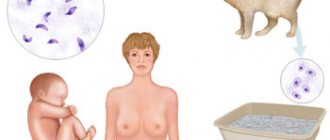Due to the increasing frequency of urogenital infections in young women, questions about how STDs affect the course of pregnancy and what impact they have on the mother and unborn child have recently become increasingly pressing. The asymptomatic course of these diseases leads to the fact that women, when turning to a doctor about pregnancy, receive an additional “bad” diagnosis identified during a standard examination. In this case, it is necessary to begin specific therapy under the supervision of a gynecologist in order to avoid tragic consequences.
Cytomegalovirus infection (CMV)
Intrauterine infection with cytomegalovirus infection occurs in 0.4-2.3% of all newborns. Not many women acquire CMV during pregnancy, but only a few pass the virus to their fetuses. Generalized CMV infection in the fetus almost always results from a primary infection during pregnancy. Infection with viruses before pregnancy is not so dangerous for the fetus; in these cases, it is important to avoid exacerbations in early pregnancy. Intrauterine infection occurs through the placenta, as well as ascending from the infected cervix. Congenital CMV infection of a newborn leads to deafness, mental retardation of the child and other neurological disorders.
Consequences for the fetus:
- Spontaneous miscarriage. Abortion, for example, can occur during primary infection with chlamydia during pregnancy.
- Frozen pregnancy. An active inflammatory process damages a critical mass of embryonic cells.
- Hypoxia. Critical hypoxia leads to the death of the embryo, moderate hypoxia causes damage to organs and systems. Damage to the central nervous system can lead to fetal death at any stage.
— Fetoplacental insufficiency. Active infection leads to damage to the fetoplacental complex, resulting in placental insufficiency. Chronic FPN leads to self-esteem in hypotrophic, low-weight children; there may be signs of vitamin deficiency. Anemia is often observed in newborns.
— Congenital infections. If infection with chlamydia occurs primarily in the later stages, then congenital chlamydia may develop in a newborn, accompanied by urethritis, damage to the eyes, lungs, heart, intestines, liver, and brain. Gonorrhea also has a damaging effect on the fetus. Trichomonas themselves do not cause fetal deformities and do not penetrate the membranes, but can serve as transport for chlamydia and gonococci.
Congenital ophthalmochlamydia in a newborn
Herpes simplex virus (HSV type II)
Herpes is one of the most common human infections. Among patients with recurrent miscarriage, 55% are asymptomatic carriers of the herpes simplex virus type II, 10% have periodic episodes of exacerbations (itching, characteristic rashes on the genitals). It is important to separate herpes virus types I and II. More than 90% of people are infected with type I virus; the characteristic rashes are localized on the face (lips, nose) and there is no danger for pregnancy.
During pregnancy, primary HSV infection (i.e., infection directly during pregnancy) poses a great danger, and it has been noted that primary HSV infection in pregnant women is often more severe than in non-pregnant women. Very often the cervix is involved in the process with the formation of “erosion”. If the primary infection is observed in the first half of pregnancy, a high incidence of miscarriages is noted, and in later stages - premature births.
If a child is infected with HSV, a congenital syndrome is possible, which is manifested by microcephaly, intracranial calcifications, and chorioretinitis (eye damage). Most often, a child becomes infected during childbirth if there is a rash in the mother’s genital tract. Therefore, the presence of an active process of HSV infection (rash on the genitals) at the end of pregnancy in a woman is an indication for delivery by Caesarean section.
Treatment of HSV during pregnancy depends on the clinical presentation of the disease. If there is only virus carriage (without clinical manifestations), then general restorative treatment and immunomodulatory therapy are carried out to prevent the activation of infection during pregnancy. If activation of HSV and/or CMV (IgM) is detected during pregnancy, the following measures are taken: 1. Metabolic therapy. It is taken throughout pregnancy in 10-12 day courses with a break of 2-3 weeks throughout pregnancy.
- Riboxin 0.2×3 times a day;
- Pyridoxal phosphate 1 tablet x 3 times a day;
- Folic acid 1 tablet x 3 times a day;
- Phytin 1 tablet x 3 times a day;
- Potassium orotate 1 tablet x 3 times a day;
- Vitamin E 1 drop x 3 times a day;
2. Immunotherapy. Immunoglobulin is administered intravenously 25.0×3 times every other day, 3 courses per pregnancy. Viferon in suppositories (rectally); course of treatment is 7 days, 2-3 times per pregnancy. 3. Wobenzym 3 tablets x 3 times a day for a month from 26 weeks of pregnancy. Bacterial and parasitic infections during pregnancy are as common as viral infections and cause complications during pregnancy. Let's look at some forms of these infections.
Chickenpox
Refers to the so-called childhood diseases. At a younger age, it is tolerated easily and without consequences. For adults it is much more difficult. If chickenpox (more correctly, chickenpox) is “caught” by a pregnant woman, and if it turns into chickenpox pneumonia, then the risk of the child being affected is very high. Moreover, the longer the period, the greater the danger. If a pregnant woman has been in contact with someone with chickenpox, she should consult a doctor. Moreover, the sooner the better. The doctor will direct the woman to be tested for antibodies to the virus. If it is discovered that there are no antibodies to chickenpox in the pregnant woman’s body, it is necessary to administer a specific immunoglobulin. This must be done no later than 4 days from the moment of contact.
Bacterial vaginosis
Its frequency is up to 45% of all vaginal infections. It manifests itself as leucorrhoea with an unpleasant odor, a feeling of discomfort, and itching. Diagnosis is carried out using a regular vaginal smear (so-called “clue cells” are detected). Pregnancy can be complicated by premature birth, premature rupture of amniotic fluid, chorioamnionitis, postpartum endometritis. Treatment outside of pregnancy: vaginal cream “Dalacin” 2%, course of treatment 7 days. After this, in the absence of candidiasis (thrush) - acylact in suppositories or lactobacterin tablets vaginally for 10 days.
Treatment during pregnancy: possible only in the second and third trimesters of pregnancy with dalacin in the same regimen. Before childbirth, treat the vagina with Miramistin or Plivasept.
Chlamydia
Chlamydial infection is more common in patients with infertility rather than miscarriage, but if it is present in pregnant women, it can trigger the development of premature labor. Fetal damage occurs after contact with an infected genital tract. Newborns may develop chlamydial conjunctivitis and pneumonia.
Chlamydia is manifested by the presence of characteristic mucopurulent discharge from the vagina and can be determined using the same PCR. Treatment outside of pregnancy: Erythromycin 500 mg 4 times a day for 7 days or Vilprafen 0.5 mg 3 times a day for 9 days (together with nystatin 500 thousand units 4 times a day, multivitamins 2 tablets a day, Wobenzym 5 tablets 3 times a day for 40 minutes before meals 14 days).
Treatment during pregnancy: possible in the second and third trimester with erythromycin or vilprafen in the same dosage as outside pregnancy.
Vaginal candidiasis (thrush)
It is observed very often in patients with miscarriage, due to repeated treatment with antibiotics and phenomena of secondary immunodeficiency. Candidiasis manifests itself in the form of itching, burning, redness and swelling of the external genitalia. Candidiasis is detected in a regular vaginal smear. The fetus can become infected during the passage of the birth canal with the subsequent development of intestinal dysbiosis, etc.
Treatment of immunodeficiency outside of pregnancy: hygiene measures, clotrimazole - vaginal tablets (suppositories) 200 mg once a day at night for 3-6 days, Diflucan 1 tablet (150 mg).
Treatment during pregnancy: in the first trimester, vaginal rinsing with miramistin is possible. In the second and third trimesters, it is possible to use clotrimazole in suppositories and nystatin in tablets. Diflucan is contraindicated during pregnancy.
Treatment
The choice of treatment method for infection depends on the type of pathogen, stage of the disease, characteristics of pregnancy and the general condition of the woman.
Since the use of medications is undesirable for the expectant mother, the doctor assesses the possible risks of using drug therapy for the course of pregnancy and fetal development.
Treatment of a viral infection during pregnancy requires the use of antiviral drugs. The doctor should prescribe most of these drugs with caution. The safest medications include Viferon, Anaferon and Oscillococcinum.
Antibacterial agents are used to determine a bacterial infection. Most often, the doctor prescribes antibiotics from a range of penicillins, cephalosporins, and macrolides to the expectant mother.
If possible, drugs are selected for local treatment that do not affect the entire body of the pregnant woman.
Trichomoniasis
Trichomoniasis ranks first in prevalence among sexually transmitted diseases. Without treatment, these protozoa do not leave the human body and can cause various complications: infertility, fetal malformations, etc. When the mucous membranes of the genitourinary tract are affected by Trichomonas, erosions and ulcers occur on them, so pain is possible when urinating. The discharge is usually profuse and accompanied by severe itching. Trichomonas are detected using a regular vaginal smear.
When treating the genital infection of trichomoniasis (as well as all other genital infections), the following principles must be observed: treatment of both partners is carried out simultaneously; During treatment, sexual activity and alcohol consumption should be excluded; factors that reduce the body's resistance (concomitant diseases, hypovitaminosis) are eliminated; Patients with all forms of the disease are subject to treatment (including Trichomonas carriage and patients with inflammatory processes in whom Trichomonas are not detected, but these pathogens are found in sexual partners); local treatment is prescribed simultaneously with systemic drugs; curability control is carried out 1 week after the end of treatment, and then after the next menstruation.
Treatment outside of pregnancy: metronidazole 250 mg 3 times a day for 7 days.
Treatment during pregnancy: in the first trimester, metronidazole can cause fetal malformations, therefore, lubricating the mucous membranes with a solution of potassium permanganate 1:10000 or brilliant green is used. In the second trimester, it is permissible to use vaginal suppositories with metronidazole (1 suppository at night for 8-10 days). Treatment with tableted metronidazole can be prescribed only in the third trimester of pregnancy, 250 mg 2 times a day for 8 days.
Disease Prevention
It is possible to cure emerging diseases, but it is better to resort to preventive measures and avoid taking medications. The following will help protect the health of mother and child from the possible development of unwanted problems:
- abstinence;
- safe sex with barrier contraceptives;
- refusal of promiscuity;
- presence of a permanent partner;
- regular medical examinations;
- giving up drugs and alcohol.
If you have a relationship with a partner who has the herpes virus, you should definitely avoid sexual intercourse during the third trimester of pregnancy. During this period, the likelihood of transmission of infection to the embryo is highest.
If, however, a problem with sexually transmitted diseases does arise, in no case should you be embarrassed and consult a doctor promptly, since not only the health of the mother, but also the life of the baby is at risk. The reason for seeking advice may be suspicions of sexually transmitted problems or the fact of an intimate relationship with a potentially infected partner.
Toxoplasmosis
Toxoplasmosis affects up to 55% of the population. Infection occurs from cats and dogs eating thermally poorly processed meat. For the fetus, primary infection during pregnancy in the first trimester is dangerous - malformations and termination of pregnancy occur. If a pregnant woman has IgG antibodies to toxoplasmosis, the fetus will not get sick.
Treatment of genital infection outside of pregnancy: Pyrimethamine 100 mg tablet on day 1, then 25 mg every day for 1 month and Sulfadiazine 4 g daily for 1 month.
Treatment of sexually transmitted infections during pregnancy: possible in the II and III trimesters with erythromycin 0.4-0.6 g, then 0.2-0.4 g per day for 5-14 days.
Syphilis
If syphilis is in the active stage, it can cause serious pathologies of the fetus: deformation of bones and teeth, diseases of the nervous system and brain. Cases of stillbirths have been observed. Unfortunately, this disease cannot be cured. You can only “crush” him with immunity. Therefore, it is called a chronic infectious disease. If syphilis is diagnosed long before pregnancy, and the woman has taken all the necessary measures, there is a possibility of giving birth to a completely healthy child.
Mycoplasmosis Ureaplasmosis
Pathogens belong to the same class - Mycoplasmas. The most dangerous mycoplasmas for humans are Mycoplasma genitalium. All types of ureaplasma - Ureaplasma parvum, urealiticum and Mycoplasma hominis - belong to the normal flora (intestines and vagina). According to the literature, there is a fairly frequent asymptomatic carriage of mycoplasmas in the urogenital tract and its connection with inflammatory diseases of the genital organs and pregnancy. On the other hand, a number of authors consider urogenital mycoplasmas as opportunistic microflora that can cause disease only under certain conditions. They occur in infertility, miscarriage, and premature birth.
Currently, it is believed that only Mycoplasma genitalium needs to be treated with antibiotic therapy. In case of accidental detection of mycoplasmas (using PCR), it is necessary to carry out therapy aimed at normalizing the vaginal microflora and strengthening the immune system (suppositories with Viferon No. 2 rectally, 1 suppository at night for 14 days), multivitamins. Treatment outside of pregnancy: Lomflox 400 mg (1 tab) for 4 days or Doxycycline 0.1 2 times a day for 10 days. Treatment must be supplemented with nystatin, Wobenzym (the scheme is given above).
Treatment during pregnancy: during pregnancy 18-20 weeks, treatment with erythromycin 500 mg 4 times a day for 10 days is possible.
How to treat STDs during pregnancy?
Self-treatment of sexually transmitted diseases is extremely undesirable, since unqualified medical care may not only not bring results, but also aggravate the situation.
Sexually transmitted diseases that have become chronic pose a huge danger to the lives of both women and children.
It should be remembered that the body is never able to develop immunity to sexually transmitted diseases. Any dubious connection can bring the infection again, which will again have to be treated. If the virus is detected in one of the partners, both should undergo treatment.
Most sexually transmitted diseases can be effectively treated with antibiotics, which are also permitted for pregnant women. Bacterial diseases, namely chlamydia, trichomoniasis and gonorrhea, can be cured in a relatively short time. It is necessary to take medications strictly following the regimen and dose prescribed by the attending physician.
Viral infections, such as herpes or HIV, cannot be treated with antibiotics. It is only possible to improve the mother’s condition, increase her immunity and reduce the likelihood of exacerbation of the disease at the end of pregnancy by taking antiviral drugs.
To prevent the transmission of certain diseases to newborns, special drops containing an antibiotic are instilled into the eyes in the first hours after birth. For gonorrhea, for example, infants are recommended to treat their eyes with silver nitrate drops.
Drugs with a pronounced antibiotic effect negatively affect the composition of the vaginal microflora, therefore, after completing a course of antibiotics, it is necessary to undergo an appropriate test - a smear.











